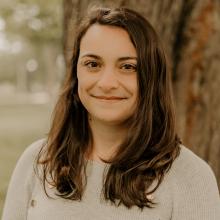April 2022 Spotlight on SRCD U.S. State Policy Fellow: Eleanor Fisk
Eleanor Fisk is a SRCD State Policy Pre-Doctoral Fellow in the Connecticut Office of Early Childhood (OEC).
When I began my Ph.D. program in Human Development and Family Sciences (HDFS) at the University of Connecticut (UConn) after teaching preschool, my goal was to address research questions about how young children’s development occurs in context and how to support the adult caregivers of young children. I was also excited to explore how research can be used to inform relevant policy and practice. I’ve been lucky to have opportunities in my graduate program to study the first two areas, particularly around the early care and education (ECE) experiences of infants and toddlers. The SRCD State Policy Pre-doctoral Fellowship has provided me the opportunity to dive much more deeply into the role research can play in policymaking.
I am placed in the Connecticut Office of Early Childhood (OEC), a cabinet-level agency responsible for early childhood programs in the state, including state-funded ECE and the child care subsidy program, early intervention (services for children with developmental delays under the Individuals with Disabilities Act Part C), and home visiting. The OEC’s mission is to partner with families of young children to advance equitable early childhood policies, funding, and programs; support early learning and development; and strengthen the critical role of all families, providers, educators, and communities throughout a child’s life. At the OEC, my fellowship placement is within the division of Research, Planning, and Technology, which is responsible for agency data governance, research and evaluation, and communicating about agency data.
The Research, Planning, and Technology division at the OEC uses data to describe the work being done across the agency, with the goal of being accessible and understandable for a variety of audiences, including policymakers. Working in this division has taught me how researchers can communicate about their work and data in a clear, concise, and understandable way. This has helped me to establish and hone goals for my future work after this fellowship, which include conducting applied research and translating findings to reach diverse audiences, including policymakers and practitioners.
The OEC receives many requests for data and information from advocates, community agencies, reporters, legislators, and researchers. One of the main projects I have worked on during my fellowship has been documenting these requests as they come in to the agency and categorizing the requests based on the OEC program(s) the requests are related to, the type of data being requested, and the geographies and timeframes included. The ultimate goal of this work is to create a publicly available, non-personally identifiable resource that includes up-to-date facts about OEC programs, which would address frequently asked questions and include commonly requested data. This project has allowed me to understand the importance of these kinds of resources as a method of communicating about the agency and its programs with a wide audience. Having resources that are clearly written and easily, publicly accessible allows interested persons (e.g., parents, policymakers, researchers) to understand the work that is happening in their state agencies.
Another project I have supported during my fellowship is the ongoing monitoring and evaluation of initiatives that the OEC has launched since the start of the pandemic using federal COVID-19 relief and recovery funds (e.g., from the American Rescue Plan Act). The OEC has provided funds for ECE programs to purchase supplies during the pandemic; directly supported the ECE workforce through relief payments, scholarships, and professional development; and provided resources to and covered fees for families. The Research, Planning, and Technology division is tasked with tracking and reporting out on who these initiatives reach and what their impact is. Starting to understand how this funding has allowed ECE programs to stay open throughout the COVID-19 pandemic and enabled families to face fewer child care-related disruptions has been incredibly meaningful as I think about the work needing to be done as we come out of the pandemic.
The SRCD State Policy Pre-Doctoral Fellowship has made an incredibly valuable contribution to my doctoral training. The fellowship has given me the opportunity to observe and practice different forms of communicating research findings across settings (e.g., academic, practice, policy), whether that’s producing research briefs or facilitating conversations about how programs and agencies can implement research findings. I also feel deeply inspired by the work happening in states and communities to better the lives of children and families and feel motivated to continue this work in my future endeavors!
